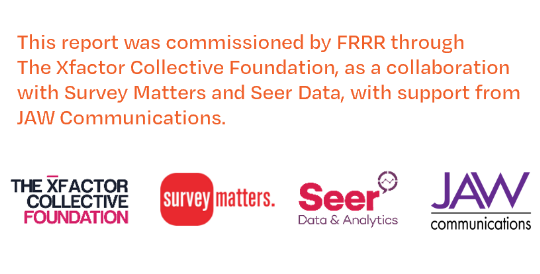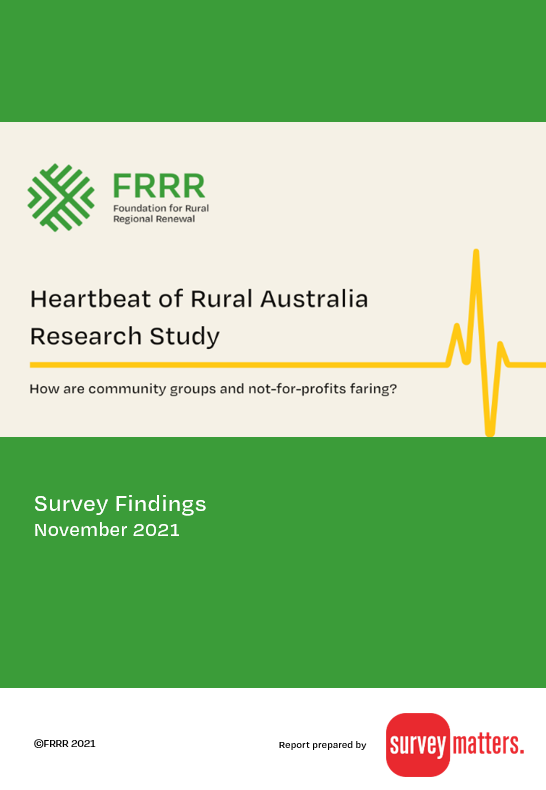Heartbeat of Rural Australia
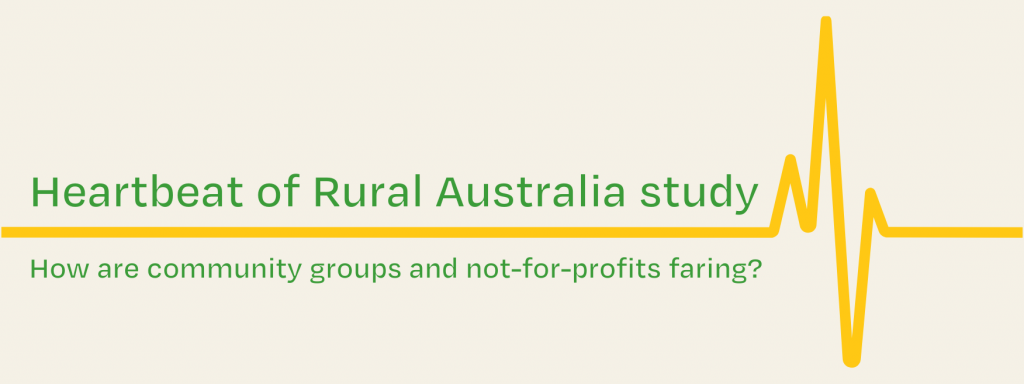
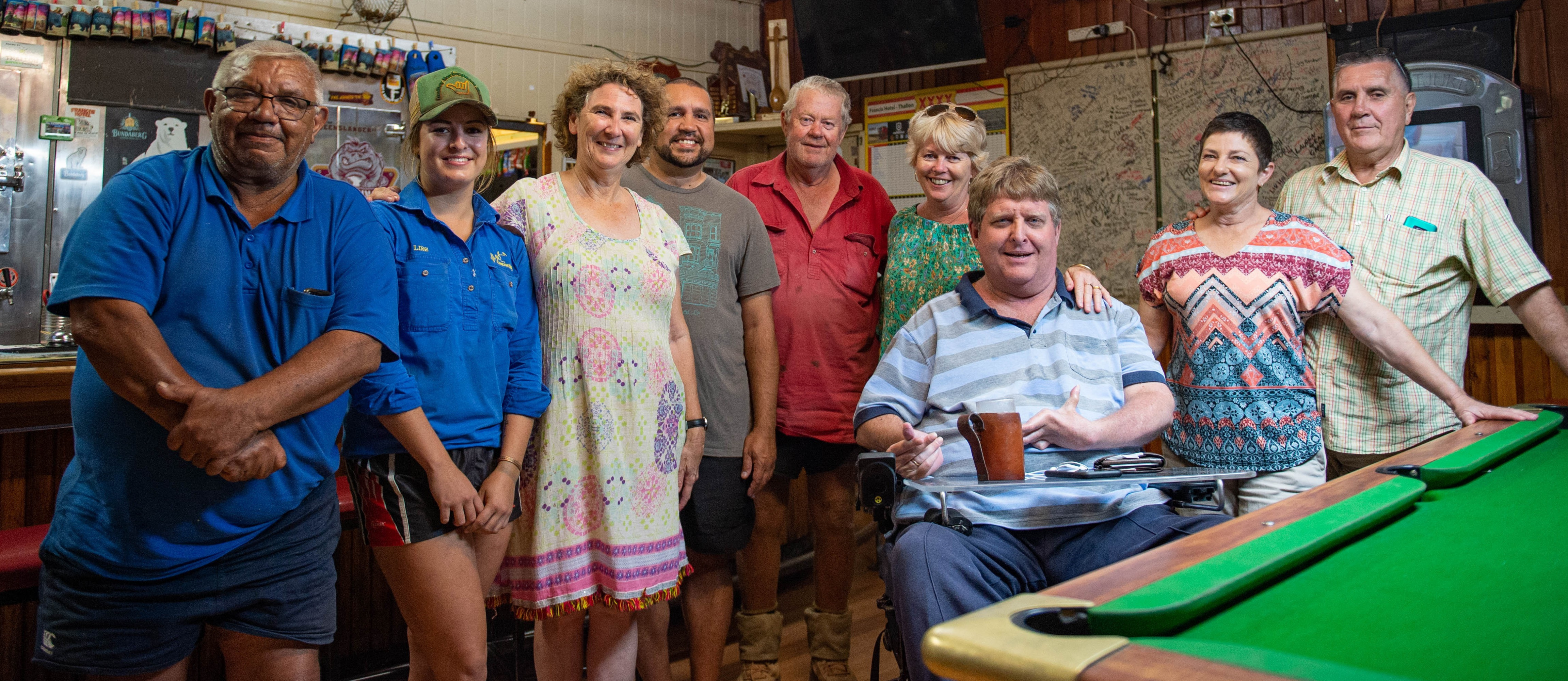
In September 2021, FRRR commissioned the Heartbeat of Rural Australia study, exploring how not-for-profits and community groups in remote, rural and regional Australia are faring, in the wake of nearly two years of constant disruptions. The study was undertaken through The Xfactor Collective Foundation, by specialist member Survey Matters.
Our aim in commissioning this research was to generate both qualitative and quantitative data to articulate the vital role that community organisations play in the social, economic, cultural, and environmental resilience and vitality of their communities and regions. We also wanted to understand the cumulative impacts of natural disasters, and COVID-19.
But above all, we wanted to help amplify and give greater authority and influence to these organisations in the design of policies, investments, and solutions for their communities’ sustainability and vitality.
You can read the report in full, or explore some of the highlights below. Thanks to our partnership with Seer Data and Analytics, you can also dive into the full dataset, and cross-reference it with other studies.
FRRR will run webinars to explore the results. We’d appreciate your help in raising awareness of the webinars:
At a Glance: The Respondents
Remote
Rural
Regional
Incorporated Associations
Registered with ACNC
DGR-1 endorsement
Turnover <$250,000
Turnover <$50,000
Run primarily by volunteers
Key findings
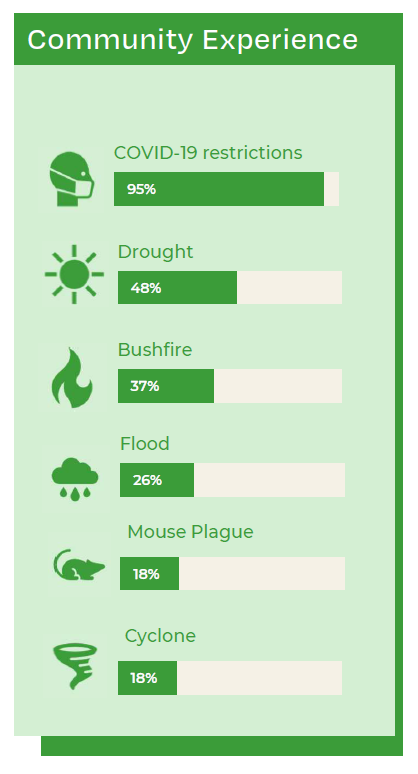
Nearly nine in 10 organisations (87%) contribute to the local economy. Almost all provide some form of cultural and social support.
In the last two years, nearly half of responding organisations had to contend with drought; 37% faced bushfires; 26% floods; and nearly 20% dealt with the mouse plague.
By far the most detrimental effect has been the inability to meet with one-another, resulting in isolation, reduced wellbeing, and increased stress.
Access to sufficient funding to continue to operate and expand capabilities is by far the largest constraint facing community groups:
The report highlighted small changes in funding arrangements that will make a big difference, including greater flexibility in how and when funding can be used.
What else do community groups want?
Explore the data further on the Seer Data and Analytics platform. Registration is free.
Frequently Asked Questions (click to expand)
1. What is Heartbeat of Rural Australia?
Heartbeat of Rural Australia is a study of remote, rural, and regional community groups and not-for-profit organisations, commissioned by the Foundation for Rural & Regional Renewal (FRRR) in September 2021.
The study sought to quantify the economic, social and cultural impact of these organisations. There was a lot of anecdotal evidence, but this study put some numbers around these impacts to reinforce the critical role they play in sustaining, vibrant remote, rural and regional communities.
This data is helping influence and inform governments, philanthropy – including FRRR – and businesses about the specific needs of community organisations outside metropolitan areas, and about what approaches and models of support work best. The data will also be made available to community groups to help them better advocate for the support that they need to strengthen and grow their organisations.
2. What were the aims of the research?
The Heartbeat of Rural Australia study aimed to provide much needed evidence to:
- Demonstrate the economic, societal and cultural role of community-based organisations;
- Measure the cumulative impacts of recent events in remote, rural, and regional areas, including COVID-19, bushfires, droughts, and floods;
- Identify the factors that affect the capacity, capabilities, influence and leadership of community organisations in their communities; and
- Determine helpful and unhelpful funder and policy-maker approaches to strengthening remote, rural, and regional communities’ self-determination, viability and sustainability.
3. Why was this research needed?
From our extensive day-to-day engagement with thousands of community groups across Australia, we know the vital social and economic role that grassroots community groups and not-for-profits play in rural communities. We also know that many are feeling the cumulative impacts of natural disasters, and of course COVID-19.
While there have been several insightful studies into the impacts of events on the social and voluntary sector, none of these specifically focused on remote, rural and regional community groups and rural issues. So, we wanted to really understand the effects on these important groups, and then help amplify this story and give greater authority and influence to these organisations in the design of policies, investments, and solutions for their communities’ sustainability and vitality.
4. Who participated in the study?
The focus for this study was grassroots community groups and local organisations – groups that are locally-led, and in and of their communities. In total, the survey received 638 responses from different locations across remote, rural and regional Australia.
5. How will the findings be shared?
The findings will be available on our website, with more detailed data available for free through the Seer Data interactive data platform.
6. Who funded this research?
This research was funded by the Foundation for Rural & Regional Renewal (FRRR). FRRR is a charity that connects common purposes and funding from government, business and philanthropy with the genuine local needs of remote, rural and regional people and places.
FRRR provides funding and capacity building support at the hyper-local level. We have the reach, relationships, networks, and know-how to align funding, big and small, to community-led solutions that build resilience and long-term viability and vitality.
7. Who undertook the research?
The research was undertaken by Survey Matters.
